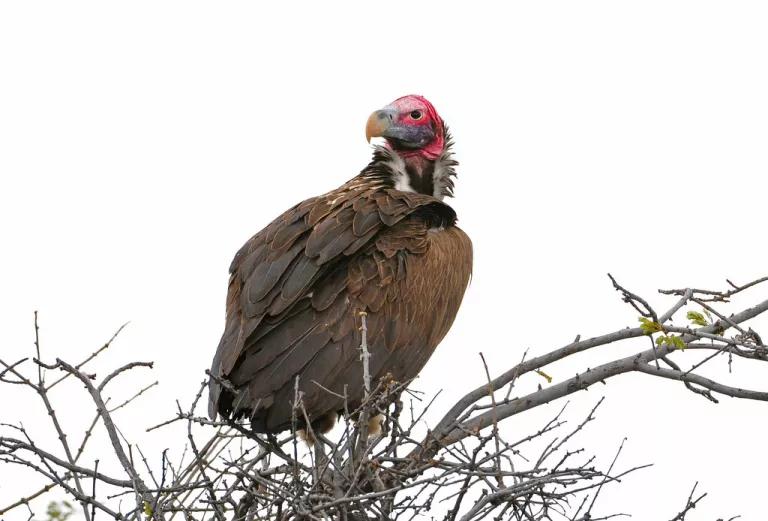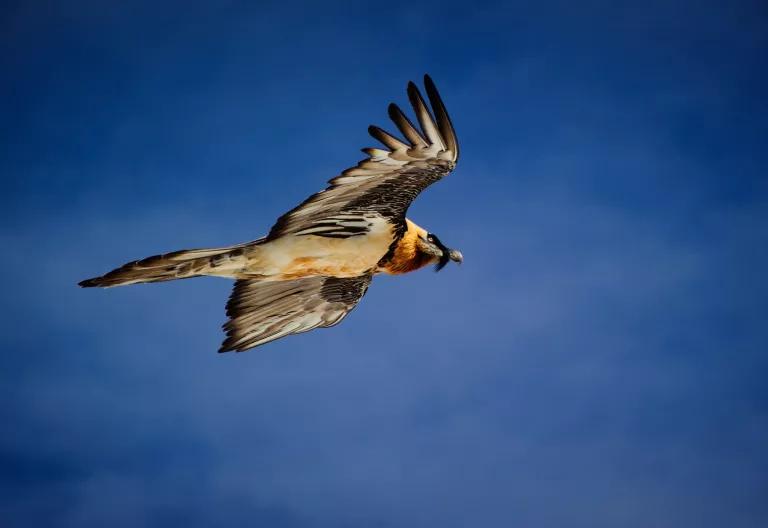Sympathy for the Vulture
Traditional medicine is threatening Africa’s soaring scavengers.

White-backed vulture at Kruger National Park.
A lost traveler claws at the desert sands. His canteen is dry. Looking up, he sees only the burning sun…and the circling of dark wings. The end must be nigh—for everyone knows that those skyward scavengers are the harbingers of death.
But vultures are birds, not the Reaper’s henchmen.
Sure, these buzzards have become a trope in television and film, but that’s not what’s concerning conservationists. Some cultures believe the bird’s relationship with death is so mystical that merely possessing a body part of the animals can grant a person the gift of clairvoyance.
It’s like granny always says: Sleep with a vulture skull under your pillow and you’ll pick better lottery numbers on the morrow!
Silly granny…everybody knows if you really want to see into the future, you have to dry out the buzzard’s brain, grind it, roll it into a cigarette, and smoke it.
If only this were a joke.
Big Birds, Big Threats
You may already know about Chinese traditional medicine and the demand it creates for products such as rhino horn and tiger genitals. Well, Africa has its own questionable medicinal practices that are threatening the conservation of myriad endangered species.
Folks in Eritrea cling to leopard claws to prevent miscarriages. In Malawi, some believe that the voice box of a lion imbues its owner with bravery, and that a handful of hyena tails can keep robbers at bay (um, maybe if you whip the thieves with them?). In South Africa, the affluent prize chameleon tongues because their stickiness is said to help people hold on to their wealth.
Last year, a team of scientists conducted a continent-wide review of the use of bird species in traditional medicine in Africa. Their research, published in PLOS ONE, identified 354 avian species being sold in 25 countries. They concluded that large birds, such as vultures, hornbills, eagles, and bustards, were the most likely to be selectively harvested.
Six of the nine vulture species the team found for sale within the continent’s markets made the researchers’ list of bird species most vulnerable to the African medicine trade. According to the International Union for Conservation of Nature, two of those species are endangered (Ruppell’s vulture, white-backed vulture), three are vulnerable (cape vulture, lappet-faced vulture, white-headed vulture), and one is near threatened (bearded vulture).
These birds may be protected internationally, but the infrastructure needed to enforce conservation measures is lacking or nonexistent in many areas.
“Big birds are generally more at risk than smaller ones for one primary reason: the biology of scaling,” says Alan Kemp, study coauthor and honorary curator at the Ditsong Museum of Natural History in Pretoria, South Africa.
Scaling means that larger animals require more territory and more prey. They also tend to have lower populations, because they produce fewer offspring who then take a long time to reach sexual maturity. All these factors mean that even a little bit of pressure from humans—whether it’s hunting or habitat loss—has a big impact on their numbers.

No Rest for the Wingèd
The problem for vultures, says Kerri Wolter, CEO and founder of the vulture conservation organization VulPro, is that people conjure up so many reasons to kill them. On the one hand, she says, some people see vultures as vermin or disease-riddled birds related to the afterlife. This can lead to intentional poisonings.
Conversely, Kemp says, some revere the birds. Their keen eyesight is seen as connected to predictive abilities; the heights at which they fly suggests a connection to God; their carrion-based diet is thought to indicate resistance to disease. Such reverence, however, can be a double-edged sword as it makes the birds valuable as talismans.
A troubling new trend among poachers is to poison the elephant and rhino carcasses they leave behind, in order to kill vultures whose swarming might tip off authorities. In Namibia in 2013, 500 birds died that way after feeding on a single dead elephant.
From what little information we have, the medicinal trade seems to constitute a small portion of the threats to African vultures. “We do know it is significant, but whether it is as bad as poisonings and power lines is yet to be determined,” says Wolter. “I would say probably not.”
It’s a Living
Vivienne Williams, a researcher at the University of Witwatersrand in Johannesburg and the study’s lead author, says there’s another factor to consider.
In many cases, vulture products are linked to peoples’ livelihoods.
While most vulture species in traditional medicine trade are in danger of extinction, many more of the avian species found for sale in markets are “resilient and not at risk,” according to the team’s research. Those birds provide an important source of income for people without a lot of options. (Owls are another big seller, because of their supposed connection to witchcraft.)
Unfortunately, Wolter says mustering up conservation support for vulture species that aren’t so resilient is difficult. “Save the Corpse Eaters” doesn’t make for effective bumper stickers.
Do vultures nosh on rotting flesh? Absolutely. Have some species evolved hideous bald heads so their feathers don’t get all gunky with putrefied viscera? Probably. Did Vlad Vladikoff knowingly participate in a conspiracy to commit genocide against the Whos to teach Horton the Elephant a lesson? You know it.
But you don’t have to fall in love with vultures to want to save them. You just need to know about waste disposal.
Scavengers Need Love, Too
Who devours an estimated 70 percent of Africa’s ungulate carcasses? Not lions, not hyenas—vultures.
After a drug used on livestock, called diclofenac, inadvertently caused vulture populations in India to crash in the 1990s, wild dogs took over the role of lead scavenger, leading to outbreaks of rabies. Where there were no dogs, cattle corpses lay rotting by the roadside.
We need vultures—and owls, eagles, and songbirds. Each bird has a role to play in the ecosystem, be it scavenging, seed dispersal, or cleaning up the dead to make room for the living.
Williams and Kemp found that more birds, and more avian species, are sold in traditional medicine in Africa than on any other continent. And while the vulture drug trade may pale in comparison to other environmental concerns, such as bushmeat, habitat destruction, or the exotic pet trade, conservation efforts have to consider all the threats vulnerable species face in order to save them.
And you don’t need to smoke a vulture brain to see that.

This article was originally published on onEarth, which is no longer in publication. onEarth was founded in 1979 as the Amicus Journal, an independent magazine of thought and opinion on the environment. All opinions expressed are those of the authors and do not necessarily reflect the policies or positions of NRDC. This article is available for online republication by news media outlets or nonprofits under these conditions: The writer(s) must be credited with a byline; you must note prominently that the article was originally published by NRDC.org and link to the original; the article cannot be edited (beyond simple things such grammar); you can’t resell the article in any form or grant republishing rights to other outlets; you can’t republish our material wholesale or automatically—you need to select articles individually; you can’t republish the photos or graphics on our site without specific permission; you should drop us a note to let us know when you’ve used one of our articles.

A Leader for Conservation in Gabon and Beyond
Status Check for African Elephants
Rhino Horns Are Basically Just Giant Toenails. And These Images Won’t Let You Forget It